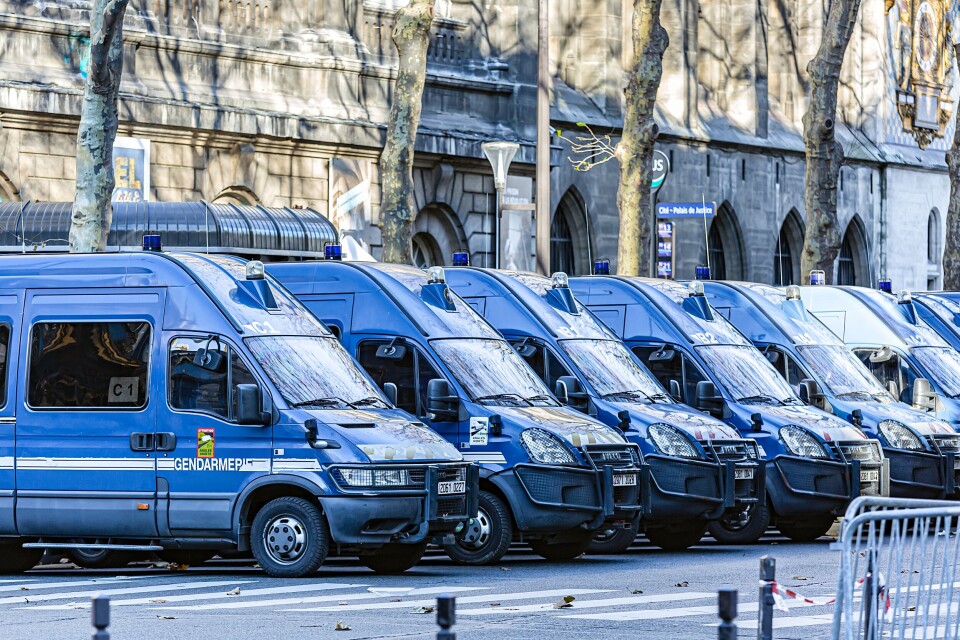-
Brigitte Bardot, global film star and tireless campaigner for animal rights, dies at the age of 91
She rose to international prominence in the 1950s and 1960s before leaving cinema at 39
-
Cars and driving: What's new in France in 2026
Including the new pollution tax on used cars, motorway toll changes and speed camera changes
-
More than a quarter of new car registrations in France are electric
EV sales hit new record in November 2025
‘Freedom convoy’: 7,200 police ready for Paris arrival tomorrow
“We are ready to act without mercy,” say police. The protest, inspired by truckers in Canada, is against anti-Covid measures such as the vaccine pass

Police in Paris are ready to confront any ‘freedom convoys’ that arrive in the capital this weekend as hundreds continue their journey to blockade roads despite authorities having banned the movement.
HGV drivers and other supporters began their drive towards Paris this week.
Social media pages suggest that major blockades are arriving from regions and towns including Normandy, Pas-de-Calais, Nice, Bayonne, Lyon, and Perpignan, with all of them planning to arrive in the capital by tomorrow (Saturday, February 12).
Quelques politesses envers le président de la République. #ConvoidelaLiberte pic.twitter.com/zVHmECu3AR
— Actu Pas-de-Calais (@ActuPasdecalais) February 11, 2022
Le #ConvoidelaLiberte du Sud-Est repart de Bron (en banlieue lyonnaise) sous la pluie et les Klaxons @RMCinfo pic.twitter.com/gWKj0jLzIs
— Florian Chevallay (@FChevallay) February 11, 2022
A map of the major convoy routes, starting points and overnight stops, has been compiled by the convoy website Convois France.
The protesters have been inspired by the actions of HGV drivers in Ottawa, Canada, where for weeks roads have been blocked with vehicles and tents to protest against anti-Covid measures, paralysing the city centre and forcing the mayor to declare a state of emergency.
Read more:Drivers in France plan Canada-style 'freedom convoy' over vaccine pass
But today (February 11), police told the AFP that they were prepared to meet the convoy, with more than 7,200 police and gendarmes ready for the weekend.
A police source said: “If roads become blocked, we will act without mercy.”
Yesterday (February 10), police in Paris officially banned the convoys, warning that the movement “risked causing public disorder”.
Read more:Paris police ban anti-vaccine pass 'freedom convoy' as hundreds on way
In a statement, it also issued a reminder that “blocking a public road” carries punishments of up to two years in jail and a fine of €4,500, as well as the confiscation of your vehicle and driver’s licence.
Organising a prohibited protest is punishable by six months in prison and a €7,500 fine, and anyone participating in that banned protest can also be fined €135.
The official Prefecture de Police Twitter account said: “Task forces made up of police officers from the prefecture of police, mobile force units and removal machines have been given firm instructions and will be able to intervene in any attempts to block the road.”
Convois de véhicules à Paris : le préfet de Police prend un arrêté d'interdiction.
— Préfecture de Police (@prefpolice) February 10, 2022
Consultez notre communiqué de presse 👇 pic.twitter.com/8Jq1r2SIYj
The account later shared photos of its “special engines” as well as “anti-blockade tractors”.
Interior Minister Gérald Darmanin said that he was in favour of people’s right to protest, but only “within a legal framework accepted by all”.
#Manifestation 📢 | Engagés en soutien des forces mobiles, des engins spéciaux employés par la @prefpolice seront déployés à #Paris :
— Préfecture de Police (@prefpolice) February 11, 2022
🔵 Tracteurs anti-barricades pic.twitter.com/NT7kJ2M7Cg
He told LCI: “If people want to protest normally, they can…[but] if they want to block traffic, we will intervene.”
But one protester, 27-year-old Adrien Wonner from Normandy, told the AFP: “We’ve been organising this for long enough. We’re getting to the capital no matter what.”
Social media ‘gilets jaunes’ style movement
Inspired by truck drivers in Canada, the movement in France has also been developed in much the same way as the gilets jaunes protests of 2018 and 2019, and has depended heavily on social media, including Facebook and encrypted messaging service Telegram.
One protester, Amaury Martelet, told FranceInfo earlier this week that the ‘freedom convoy’ is about “getting back our freedom, which has been limited by the current government”, especially when it comes to “the obligatory vaccine pass, which restricts freedom and is not a sign of a proper democracy”.
Other protesters have insisted that the movement is not a protest against the Covid vaccines but against constraints placed on unvaccinated people.
One, named Marc, said: “Recently, I have been protesting against the vaccine pass in Lyon. It is a measure that I do not understand, but I am saying this as someone who has had three vaccine doses.”
Comparisons with the gilets jaunes have been drawn because the drivers are also protesting against sharp rises in the price of fuel and increases in French toll road tariffs, which came into effect this month.
Related articles
Drivers in France plan Canada-style 'freedom convoy' over vaccine pass
























